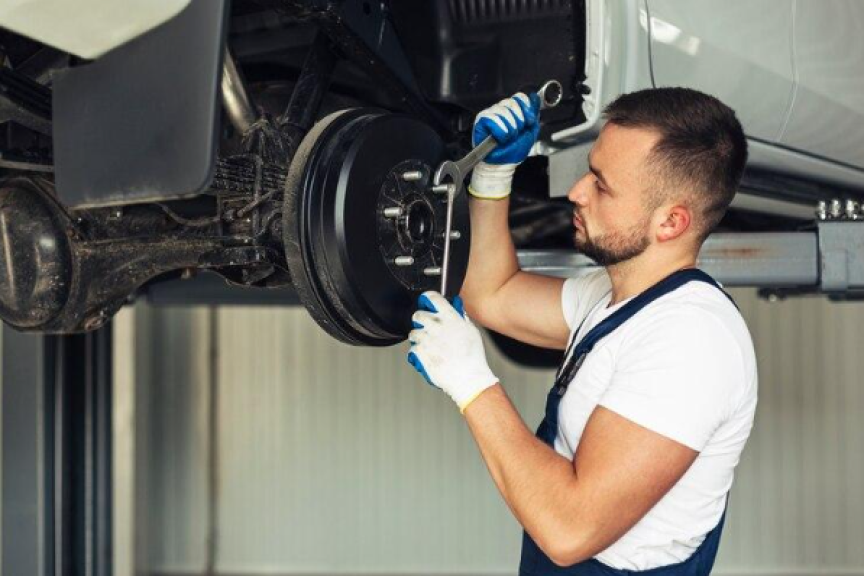Is Your Range Rover Air Suspension Failing? Discover the Warning Signs

Is your Range Rover’s air suspension failing and making your drive feel unstable? A malfunctioning system can lead to uneven ride height, poor handling, and even a suspension warning light on your dashboard. Delaying air suspension repair can result in costly damage to other components, including the compressor and air springs. Studies show that over 60% of Range Rover suspension failures start with minor leaks that worsen over time. Addressing issues early not only prevents expensive car repairs but also ensures a smooth, controlled ride. Keep reading to learn the key warning signs and why immediate air suspension repair is essential for your Range Rover’s performance.
What is Air Suspension in Range Rovers?
Air suspension is an advanced vehicle suspension system that replaces traditional coil springs with air springs, providing a smoother ride and improved handling. This system is particularly beneficial for luxury SUVs like the Range Rover, where comfort and adaptability are key. Unlike conventional suspensions that rely on fixed steel springs, air suspension uses pressurized air to adjust the vehicle’s height dynamically, offering better stability, control, and off-road capability.
Key Components of Range Rover Air Suspension
A Range Rover’s air suspension system consists of several crucial components working together:
-
Air Springs (Airbags)
-
These replace traditional coil springs and are made of durable rubber and polyurethane.
-
-
-
Each air spring is filled with compressed air to provide cushioning and support.
-
Over time, airbags can develop leaks due to wear and tear.
-
-
Air Compressor
-
The compressor is responsible for generating and maintaining air pressure in the system.
-
It pumps air into the air springs as needed to adjust ride height.
-
If the compressor runs too long or makes excessive noise, it could be a sign of system failure.
-
-
Valve Block (Air Distribution System)
-
Controls how air is distributed to the air springs for proper height adjustment.
-
If it malfunctions, the suspension may sag unevenly or become unresponsive.
-
-
Height Sensors
-
Located near each wheel, these sensors monitor and adjust ride height based on road conditions.
-
Faulty sensors can lead to incorrect adjustments, causing handling problems.
-
-
Electronic Control Module (ECU)
-
The brain of the air suspension system, it processes data from sensors and adjusts air levels accordingly.
-
If the ECU malfunctions, the system may fail to raise or lower the vehicle correctly.
-
-
Air Lines and Fittings
-
These carry pressurized air from the compressor to the air springs.
-
Leaks in the air lines can result in a loss of suspension performance.
-
How Air Suspension Works in a Range Rover
The air suspension system in a Range Rover is designed to provide an adaptable ride experience. Here’s how it functions:
-
Adjustable Ride Height
-
The system automatically lowers or raises the vehicle based on driving conditions.
-
At high speeds, it lowers the ride height to improve aerodynamics and fuel efficiency.
-
For off-road driving, it can raise the vehicle for better ground clearance.
-
-
Self-Leveling Feature
-
When carrying a heavy load or towing, the air suspension adjusts to maintain a balanced ride height.
-
This prevents sagging and improves stability.
-
-
Smooth Ride Quality
-
The air springs absorb road bumps better than steel springs, providing a luxury driving experience.
-
The system automatically adjusts damping for optimal comfort and control.
-
-
Terrain Response System Integration
-
Range Rovers use Terrain Response technology, which allows the driver to select different suspension modes (e.g., Comfort, Off-Road, Sport).
-
The air suspension system adjusts accordingly to enhance traction and performance.
-
Why is Air Suspension Important for Range Rovers?
Range Rovers are built for both luxury road driving and off-road performance, and the air suspension system plays a vital role in achieving this balance. It enhances:
-
Ride Comfort – Absorbs shocks and bumps for a smoother ride.
-
Handling & Stability – Adjusts suspension stiffness based on driving conditions.
-
Off-Road Capability – Raises the vehicle for better ground clearance.
-
Fuel Efficiency – Lowers at high speeds to reduce drag.
-
Load Handling – Self-leveling prevents uneven weight distribution.
However, as advanced as this system is, air suspension failures are common if not properly maintained. Issues like leaks, compressor failure, or worn-out air springs can lead to expensive repairs. Recognizing early warning signs of air suspension problems can help avoid costly breakdowns and ensure a smooth ride.
Common Signs of Air Suspension Failure in Range Rovers
A failing air suspension system can lead to serious performance and safety issues if left unchecked. Unlike traditional coil springs, air suspension components rely on air pressure, sensors, and electronic controls, making them prone to wear and malfunctions over time. If you notice any of the following warning signs, you should go for Range Rover Suspension Repair immediately.
1. Uneven Vehicle Height or Sagging Suspension
-
If one side of your Range Rover sits lower than the other, it could indicate air leaks in the system.
-
A sagging rear end or a tilted stance when parked is a clear sign of failing air springs.
-
Sometimes, the entire vehicle may sit lower than normal, meaning the air compressor isn’t maintaining proper pressure.
✅ Quick Test: Park your car on level ground and measure the height of each wheel arch. If there’s a significant difference, you might have an air suspension leak.
2. Suspension Warning Light on the Dashboard
-
Modern Range Rovers are equipped with electronic monitoring systems that detect air suspension problems.
-
A yellow or red suspension warning light may appear if the system detects low pressure, sensor failure, or compressor issues.
-
Ignoring this warning can lead to further damage and costly repairs.
✅ Quick Fix: If the suspension warning light appears, get a professional air suspension diagnostic immediately.
3. Noisy or Overactive Air Compressor
-
The air compressor is responsible for maintaining the correct air pressure in the system.
-
If the compressor runs continuously or makes loud noises (buzzing, grinding, or clicking), it might be struggling to keep up due to:
-
Leaks in air springs or lines
-
A failing compressor motor
-
Blocked or damaged air filters
-
-
Eventually, an overworked compressor will burn out, leading to expensive replacement costs.
✅ Warning Sign: If you hear the compressor running for longer than 30 seconds after startup, it could be a sign of a major air suspension failure.
4. Rough or Bumpy Ride
-
One of the biggest advantages of air suspension is its ability to provide a smooth ride.
-
If your Range Rover suddenly feels stiff, bumpy, or rough over small road imperfections, the suspension isn’t absorbing shocks properly.
-
Possible causes include:
-
Deflated air springs
-
Leaking air struts
-
Malfunctioning suspension control module
-
✅ How to Check: Drive over a speed bump—if the ride feels excessively harsh or bouncy, your air suspension is likely failing.
5. Vehicle Drops Overnight or After Parking
-
If your Range Rover looks fine when running, but sags overnight, there may be a slow air leak in the air springs, valve block, or air lines.
-
This issue is common in older Range Rover models where rubber airbags deteriorate over time.
✅ Test at Home: Park your car, leave it overnight, and check the ride height in the morning. If it has dropped, there’s likely an air suspension leak.
6. Difficulty Adjusting Ride Height (Suspension Mode Issues)
-
Range Rovers are equipped with an adaptive air suspension system that allows you to adjust ride height for off-road, highway, or comfort settings.
-
If your vehicle fails to rise or lower properly, this could indicate:
-
A failing air compressor
-
Blocked air lines
-
Malfunctioning height sensors
-
✅ Common Problem: The off-road mode not engaging or the vehicle staying stuck in low height mode can be a sign of an issue with the electronic suspension system.
7. Leaking Air Springs or Air Lines
-
Over time, rubber air springs can crack, leading to slow or sudden leaks.
-
Leaks in air lines or connections can cause the suspension to lose pressure, making it difficult to maintain proper height.
✅ DIY Leak Test: Spray soapy water on the air springs and air lines—if bubbles appear, there’s an air leak.
8. Increased Tire Wear and Handling Issues
-
A failing air suspension affects the vehicle’s alignment, leading to uneven tire wear.
-
Poor suspension can also cause unstable handling, making the steering feel loose, sluggish, or unresponsive.
-
If ignored, this can increase the risk of accidents, higher fuel consumption, and costly tire replacements.
✅ Red Flag: If your Range Rover pulls to one side or feels unstable at high speeds, it could be due to a suspension problem.
Why You Shouldn’t Ignore Air Suspension Issues in Your Range Rover
Your Range Rover’s air suspension is designed for a smooth, stable ride, but ignoring suspension problems can lead to serious mechanical failures, high repair costs, and even safety risks. Many owners delay Range Rover Repair in Dubai when they notice minor issues like a sagging ride or suspension warning light, but these small problems can quickly turn into expensive breakdowns. Here’s what happens if you don’t address air suspension failures in time:
-
Uncomfortable and Rough Ride – A failing air suspension system leads to excessive bouncing, vibration, and a stiff ride. You’ll feel every pothole and road bump, making long drives uncomfortable and reducing overall driving pleasure.
-
Uneven Tire Wear and Wheel Misalignment – Faulty air suspension disrupts wheel alignment, causing uneven pressure on your Range Rover’s tires. This can result in rapid tire wear, reduced traction, and the need for frequent tire replacements—costing thousands of dirhams over time.
-
Increased Strain on Other Suspension Components – When air springs or the compressor stop working properly, other parts like control arms, shocks, and axles take on more stress. Over time, these parts will wear out faster, leading to expensive, widespread suspension damage.
-
Risky Handling and Safety Hazards – A failing suspension system affects steering precision, stability, and braking efficiency. Your Range Rover may start pulling to one side, feel unstable at high speeds, or take longer to stop—significantly increasing the risk of accidents.
-
Lowered Ground Clearance and Poor Off-Road Capability – Without a working air suspension system, your Range Rover won’t be able to adjust its height properly. This reduces off-road capability, increases the risk of undercarriage damage, and makes it harder to drive over speed bumps, curbs, or rough terrain.
-
Air Compressor Overload and Complete System Failure – A struggling air compressor may work overtime to compensate for air leaks or sensor failures, eventually burning out. A dead compressor can make your entire air suspension system non-functional, forcing you into an expensive full replacement.
-
Soaring Repair Costs Due to Neglect – Small air suspension repairs (like fixing leaks or replacing sensors) are affordable, but delaying them can lead to full air suspension failure, which can cost AED 10,000–25,000 to repair. Fixing issues early can prevent massive expenses later.
Ignoring air suspension issues will only make matters worse, costing you more money and reducing your Range Rover’s performance and safety. If you notice uneven ride height, suspension warning lights, or handling issues, schedule a professional inspection immediately to prevent further damage.
























